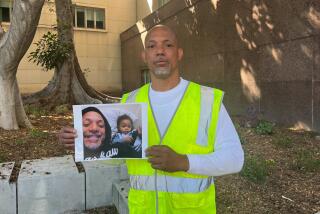Boy’s Allergies Cause Mom to Resist Schooling
- Share via
NEW MILFORD, Conn. — Dalton Perreault-Osborne should be in the sixth grade. Instead, he has barely attended school since the second grade.
His is a life of looming fear. He avoids opening doors, touching stair railings or shaking hands. Everything must be wiped. Dalton, 11, has severe allergies to peanuts and some fruits and vegetables. He also has asthma.
His mother, Lynn Osborne, has been engulfed in an extraordinary four-year legal battle with school officials that has sparked a new state law, lawsuits and even charges of parental neglect.
The two sides have been unable to agree on an appropriate emergency response if Dalton has an allergic reaction in school and requires a potentially lifesaving injection of epinephrine.
Osborne wants her son to receive the injection immediately, but said that under the plan at Sarah Noble Intermediate School, he might not be injected for up to 30 minutes after an allergic reaction.
“You don’t get any second chances if it’s not done right,” she said.
She released an affidavit from her son’s pediatrician, Dr. Evan Hack, who said the plan was not appropriate because it did not assign one person to be with Dalton at all times and immediately administer epinephrine if he had an allergic reaction.
Attorneys for the school district defend the plan, saying school officials have complied with the law.
“The evidence just did not support the mother’s contention that he needed [the injection] instantaneously,” said attorney Michael McKeon, whose firm has represented about 60 school districts. “The plan was the most comprehensive accommodations plan for a child with allergies that I have seen.”
Citing court documents, he said that Dalton would receive the injection quickly and that many staff were trained to administer it.
The dispute comes as schools nationwide cope with a growing number of students with allergies. A recently published study by the Food Allergy and Anaphylaxis Network, a nonprofit advocacy group in Virginia, found that the number of children in the United States who are allergic to peanuts has doubled in the last five years, to 600,000 in 2002.
Dalton’s mother and older sister watch him for signs of a reaction. Sometimes he grows fidgety, his face turns white or even purple, and he grabs his throat to plead for help as his tongue swells.
“You start having trouble breathing,” Dalton said. “Saliva is coming out of your mouth. I think sometimes I get scared. I kind of start to cry sometimes.”
Peanut allergies account for 50 to 100 deaths in the United States each year.
Severe allergic reactions have also claimed the lives of schoolchildren, although the precise number is unknown, said Anne Munoz-Furlong, founder and chief executive of the food allergy network. One factor in the deaths is a delay in recognizing symptoms and administering epinephrine, she said.
The importance of protecting allergic children was vividly demonstrated in Spokane, Wash., in 2001 when a 9-year-old boy, known to be allergic, died after being given a peanut butter cookie during a field trip.
Allergic children like Dalton who also have asthma are especially vulnerable.
“It is critical that schools take this seriously,” Munoz-Furlong said. “Some schools are handling it very well. Other schools are struggling.”
Schools that have struggled typically are not united on a policy and face resistance from parents whose children are not allergic, Munoz-Furlong said.
Other schools are proactive, involving parents, staff and students. Programs include peer education and rewarding students with “pal hero” certificates if a child takes action to prevent an allergic reaction.
In response to a girl with severe peanut allergies a few years ago, Ridge Street Elementary School in Rye Brook, N.Y., stopped selling peanut butter sandwiches and other peanut products, set up a “peanut-free table,” and urged parents not to pack peanut-based lunches and snacks.
Munoz-Furlong said she is not aware of any school that has successfully banned peanut products.
The issue has sparked so much controversy that some private schools have rejected students with severe peanut allergies, said Barry Lawrence, spokesman for the food allergy network.
“Despite all that awareness, there is a lot of uncertainty and questions,” he said. “I think that’s the next issue: How do we deal with this issue as a country so we provide safe environments for children and adults?”
The dispute in New Milford is unusually protracted, but it underscores the challenging nature of the problem.
Dalton’s case was the impetus behind a 2003 state law that gives school paraeducators the authority to administer epinephrine.
After the law was passed, school officials and Dalton’s family reached a temporary agreement under which he was able to return to school in the fall accompanied by his mother.
He had an allergic reaction after attending an open house, his mother said, speculating that he may have come in contact with a trace of peanuts from shaking hands.
The two sides were never able to reach a permanent solution, and Dalton stopped attending school again in December.
Dalton, who has received limited tutoring and some home schooling during the dispute, wrote Santa that his wish was to return to school. He said he has grown bored and lonely after three years away from regular classes.
“I only get to see my friends on the weekend,” he said. “I really want to get back in school this year.”
More to Read
Sign up for Essential California
The most important California stories and recommendations in your inbox every morning.
You may occasionally receive promotional content from the Los Angeles Times.












